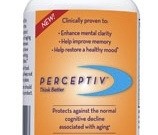B vitamins may slow cognitive decline: Oxford University study
A daily combination of folic acid, and vitamins B6 and B12 was associated with a 30% reduction in levels of the amino acid homocysteine, and improvements in a range of mental tests, including global cognition and episodic memory.
“One interpretation [of the data] is that lowering homocysteine concentrations by administering B vitamins slows brain atrophy, which in turn slows both cognitive and clinical decline,” wrote researchers from the University of Oxford and the University of Oslo.
“Such an interpretation is consistent with several studies showing that whole brain atrophy rate is strongly correlated with decline in various cognitive measures, including the CDR, in participants with MCI.
“The findings of the VITACOG trial give strong support to the idea of using measures of brain atrophy as end points in clinical trials of disease-modifying treatments.”
Cognitive decline
Wasting in the brain, or atrophy, is a common symptom of mild cognitive impairment (MCI), and can be an early warning to signs of dementia.
One important factor determining the rate of atrophy appears to be raised concentrations of the amino acid homocysteine.
Previously, epidemiological studies have reported that high levels of homocysteine are associated with suspected or confirmed dementia. Indeed, the Framingham study reported that people with homocysteine levels above 14 micromoles per litre of serum had twice the risk of dementia.
Tissue and plasma concentrations of homocysteine are known to be determined by vitamin B status, as they are cofactors for enzymes involved in homocysteine metabolism.
The new study investigated the links between vitamin B supplementation, homocysteine levels, and cognitive function.
Vitacog details
The Vitacog study involved 266 people over the age of 70 with diagnosed mild cognitive impairment. Participants were randomly assigned to receive either placebo or a B vitamin supplement providing 0.8 mg per day of folic acid, 0.5 mg of vitamin B12 and 20 mg of vitamin B6 (TrioBe PlusW from Swedish company Meda AB/Recip AB) for two years.
At the end of the study the researchers report that homocysteine levels decreased by an average of 30% in the B vitamin group, compared with placebo.
In addition, executive mental function was stabilized in the B vitamin group, compared with placebo.
When the Oxford and Oslo-based scientists looked specifically at people with high homocysteine levels (greater than 11.3 micromoles per liter) they found that B supplementation was associated with significant improvements in global cognition, episodic memory, and semantic memory.
“Among our tests, the effect of B-vitamin treatment was most striking for episodic memory, where intervention for 2y in participants with high levels of homocysteine gave a 69% higher likelihood of correct word recall compared with placebo,” they wrote.
“Furthermore, there was a significant difference in the rate of decline between the treatment and placebo groups. The same pattern was also observed for the [global cognition] and category fluency (semantic memory) tests.
“Thus, although the study was not originally powered for effects on cognitive performance, we have observed significant effects of B-vitamin treatment in mild cognitive impairment-relevant cognitive domains in the pre-specified analyses according to baseline homocysteine.”
Controversy
While this study reported benefits for B vitamin supplementation on cognitive function, others have not. Commenting on this issue, the researchers said that this may be related to study design differences.
“We included participants with mild cognitive impairment, who were followed for two years, during which the placebo group underwent significant cognitive decline.
“Several of the trials without treatment effect may have been too short in duration, excluded vitamin B12 or B6 supplements or had participants who were either healthy and therefore did not decline or included patients who already have dementia too advanced for an improvement to be readily detected.”
Source: International Journal of Geriatric Psychiatry
Published online ahead of print, doi: 10.1002/gps.2758
“Cognitive and clinical outcomes of homocysteine-lowering B-vitamin treatment in mild cognitive impairment: a randomized controlled trial”
Authors: C.A. de Jager, A. Oulhaj, R. Jacoby, H. Refsum, A.D. Smith
















